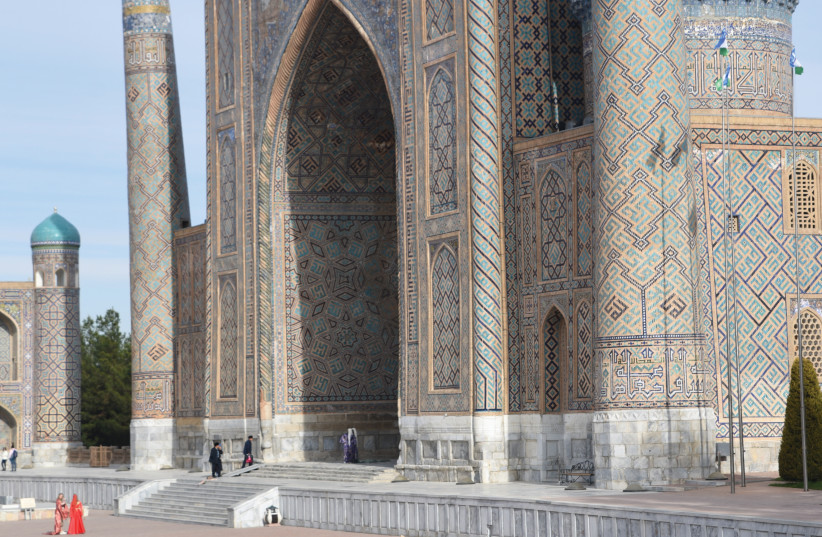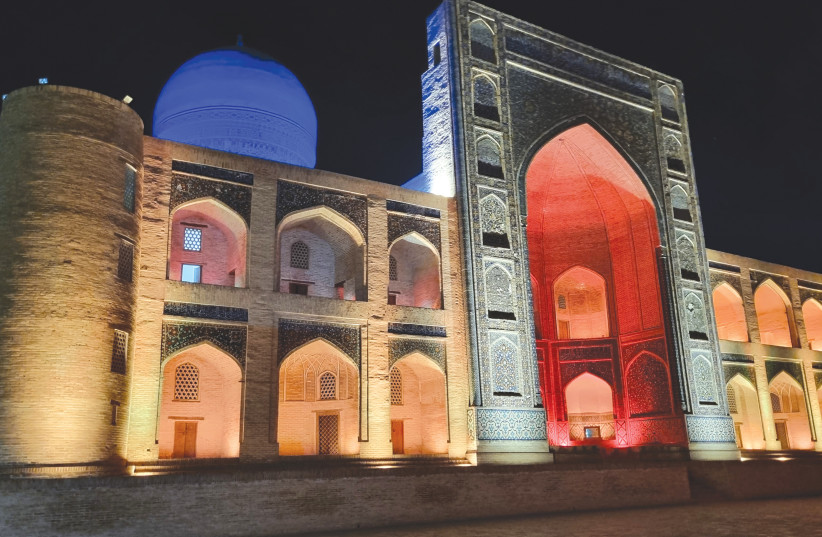There are some 130 ethnicities represented in Uzbekistan today. The faces are European, Near Eastern, Central Asian, Iranian and Far Eastern, and come in many other shapes and shades. But, everywhere you go, Uzbeks share a desire to welcome visitors and yes, that includes Jews and Israelis. A warm smile and a hand placed over the heart are guaranteed everywhere.
Uzbekistan is open to tourism and looking to expand its reach. Uzbekistan Airways already flies regularly between Tel Aviv and Tashkent, and now Air Marakanda, the company operating a gleaming new airport in historic Samarkand, is talking about receiving direct flights from Israel.
There is something of the Arabian Nights about the country’s main historic cities, even though Uzbekistan is not Arab. Magnificently-designed madrasas (centers of Islamic learning), mosques and mausoleums dominate Samarkand and Bukhara, floodlit at night to tremendous effect. Tourists are tempted by cheap trinkets and Uzbek headgear, while wealthy travelers fly in to purr over hand-made silk carpets that can retail for anywhere up to $100,000 (NIS 353,000).
Historically, Uzbekistan was heavily influenced by all its neighbors and those further afield. Many of its citizens speak numerous languages in addition to Uzbek, including Tajik (similar to Persian), Kazakh, Turkish and Russian, and there are even a few Hebrew speakers. While the vast majority of Jews live in Tashkent – some 3,000 – there are also small communities in the tourist centers of Samarkand and Bukhara.
In Samarkand, 16 or 17 people attend Shabbat services, with that number swelling to a few dozen for Jewish holy days in the domed Gumbaz Synagogue – one of two in town. The building is down a narrow street in a residential area. The synagogue complex includes the main Bukharan prayer hall, with a smaller beit-midrash-style room for Ashkenazim. The community took in hundreds of Europeans fleeing the Holocaust. These days, most Jews have left the city for Israel and the United States.

“I am the baby of the community,” says its leader, Yosef Tilaiev, 73.
As we bid him farewell, he asks “Would you like to see the Jewish hammam?” Despite the lack of community members, around the corner from the synagogue, there is what looks like the entrance to a small light-industry business. The only hint of what lies within is the sign: Hammomi Dovudi or David’s Hammam. It’s still in use, with an in-house caretaker who has a stack of towels and a TV tuned to soccer.
In Bukhara, the synagogue lies yards from one of the main squares in the old town. It’s also a two-sanctuary affair – one less grandiose for winter and another airier prayer room for the warmer months. Community president Abram Borisovich Iskhakov shows visitors a 1,000-year-old Torah scroll before chanting from a variety of prayer texts in a rich baritone, with a distinctive Bukharan accent. He says five new families recently joined the synagogue but admits many left the city in the post-Communist era.
Across town lies the still-used Jewish cemetery and within, a 1,250-year-old mikvah in what can only be described as a cave under what looks like a precursor to Jerusalem’s Shrine of the Book.
What is Uzbekistan like?
THE COUNTRY comprises a dozen provinces and the Republic of Karakalpakstan with some 36 million citizens. Traveling between the major tourist hubs is easy. The Afrosiyob bullet train is comfortable and serves great coffee.
The government is keen to tell the story of all Uzbeks and has hosted a series of major conferences of late, including the Shanghai Cooperation Organisation Summit 2022, the Summit of the Organization of Turkic States in November 2022, both in the brand-new convention, hotels and tourist village area of Samarkand, and the Tashkent International Tourism Fair in December.
The Tashkent fair gave all the provinces a chance to show off their attractions, heritage and culture. The event filled three exhibition halls and brought in visitors from across Central Asia and beyond. Dancers from Kyrgyzstan rubbed shoulders with knife-makers from Kazakhstan and local wine producers, who have created some outstanding vintages, such as the 2019 Bazigazan merlot.
The sizeable Samarkand Syob market brings together some of the juiciest dried fruit, with a variety of soft cheeses, sweets, juices and spices one simply cannot find in the West.
Uzbek restaurant fayre is heavily meat-based, with lamb the firm favorite. Locals enjoy a daily dose of plov, the national dish made from rice with chunks of meat, carrots, onions and spices and lots of aromatic flavors cooked in a large vessel over an open fire.
While the country is Muslim (94%), city life is what you make of it, with alcohol available. Most women do not cover their hair but many men wear a variety of hats from different regions, more cultural than religious. There are churches and even a Zoroastrian Anjuman in operation.

The country has big plans to boost its economy, with a large emphasis on tourism. It has so much to offer visitors, with prices largely very affordable, a great selection of accommodation types and incredible historic sites, including one of the world’s most-significant early 15th-Century observatories, the Prophet Daniel’s burial site and Khiva, which will be the tourist capital of the Islamic world in 2024.
But above all else, it has some of the friendliest, most helpful people on the planet, starting with the country’s Ambassador to Israel Feruza Makhmudova, who sees it as her personal mission to encourage Israelis to visit her homeland – and if that means getting to Ben-Gurion Airport at 4 a.m. to bid visitors a cheery “Bon voyage!” then so be it.
The writers were the guests of Uzbekistan Travel, Silk Road Samarkand, Uzbekistan Airways and Air Marakanda. They host The Jerusalem Post Podcast – Travel Edition.
